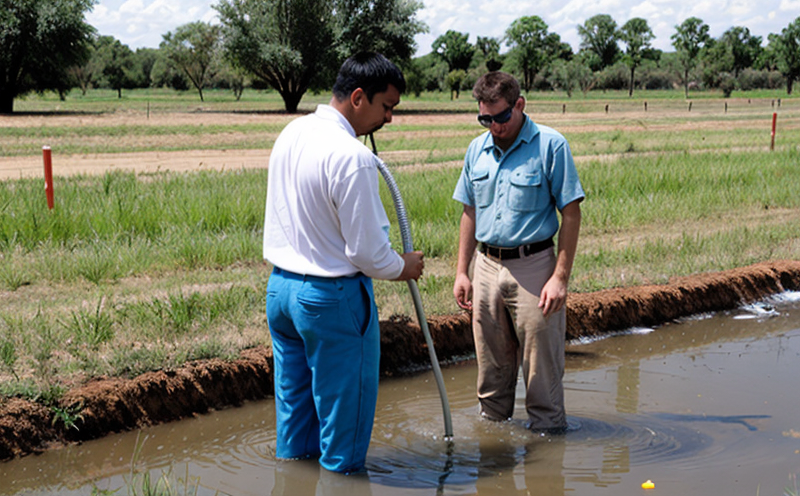ISO 9308-1 Escherichia Coli Test in Groundwater
The ISO 9308-1 standard is a crucial tool for the analysis of coliform bacteria, particularly Escherichia coli, in environmental waters such as groundwater. This method provides a standardized approach to identifying fecal pollution, which can pose significant health risks if present at unsafe levels.
The presence of E. coli serves as an indicator organism for the possible presence of pathogenic microorganisms in water. The test is widely used by governments and industries to ensure compliance with drinking water standards and protect public health. Groundwater, being a critical source of potable water, requires strict monitoring to prevent contamination from agricultural runoff, septic systems, or industrial waste.
The ISO 9308-1 method involves the use of multiple-step procedures to achieve accurate results. The first step is the collection and preservation of samples for transportation to the laboratory. Proper sampling techniques are essential to avoid any contamination that could alter the test results. Samples are then prepared by diluting them with a suitable medium, typically a buffer solution or nutrient broth.
The sample preparation process must be conducted under strict conditions to ensure the integrity of the testing procedure. The samples are incubated at specific temperatures for an extended period, allowing any coliform bacteria present to multiply and produce detectable levels of enzyme activity. This step is critical as it ensures that even low concentrations of E. coli can be detected.
The detection process involves the use of a lactose fermentation test, which is one of the most common methods for identifying coliform bacteria. In this procedure, the sample is inoculated into an agar plate containing lactose and other growth promoters. If E. coli is present, it will ferment the lactose, producing acid and gas that can be detected visually as a change in color or bubbling on the agar surface.
The results of these tests are then analyzed using statistical methods to determine whether the water sample meets the acceptable limits for coliform bacteria. The ISO 9308-1 standard provides guidelines for acceptable levels, which vary depending on the intended use of the water. For example, drinking water must not contain detectable levels of E. coli, while recreational waters may allow a higher threshold.
The accuracy and reliability of these tests are paramount in ensuring public health and environmental safety. The standard also includes provisions for quality control measures to ensure that the laboratory maintains high standards throughout the testing process.
Testing groundwater for E. coli is not just a regulatory requirement; it is an essential part of safeguarding human health and protecting ecosystems. By adhering to ISO 9308-1, laboratories can provide accurate and reliable data that informs decision-making processes in water management.
Scope and Methodology
| Step | Description |
|---|---|
| Sample Collection | Collection of groundwater samples using sterile techniques to ensure the integrity of the sample. Samples should be preserved at appropriate temperatures. |
| Preparation | Dilution of water samples with a suitable medium and incubation to allow for bacterial growth. |
| Incubation | Incubation at 35°C ± 1°C for 24 hours ± 0.5 hour under aerobic conditions. |
| Detection | Lactose fermentation test to detect the presence of E. coli. |
| Results Interpretation | Analyzing results using statistical methods in accordance with ISO 9308-1 standards. |
Benefits
The implementation of the ISO 9308-1 standard for testing E. coli in groundwater offers numerous benefits to environmental and public health sectors. This method ensures that water supplies are safe for consumption, reducing the risk of waterborne diseases such as gastroenteritis, typhoid fever, and cholera.
The standardized approach provided by this test enhances the reliability of results across different laboratories, allowing for consistent data collection and analysis. This is particularly important in large-scale environmental studies where multiple samples need to be analyzed simultaneously.
Compliance with ISO 9308-1 helps organizations meet regulatory requirements set by various authorities worldwide. For instance, the U.S. Environmental Protection Agency (EPA) has adopted this standard for monitoring drinking water sources. Adherence to these standards not only ensures legal compliance but also builds trust among stakeholders and the public.
The test is crucial in identifying potential contamination issues early on, enabling prompt corrective actions if necessary. This proactive approach helps prevent widespread health problems caused by contaminated groundwater. Regular testing of water supplies can help identify sources of pollution and allow for targeted interventions to mitigate risks.
Moreover, the accurate detection of E. coli provides valuable information about the overall quality of groundwater resources. This data is essential for sustainable resource management practices that aim to protect both natural ecosystems and human populations relying on these resources.
Eurolab Advantages
At Eurolab, we pride ourselves on offering comprehensive environmental testing services tailored specifically to meet the needs of our clients in various sectors. Our expertise lies in providing accurate and reliable data using cutting-edge technology and methodologies like ISO 9308-1 for E. coli detection.
We employ highly trained professionals who are certified in performing these tests according to international standards. This ensures that every sample analyzed is handled with utmost care, from initial collection through final result interpretation. Our state-of-the-art facilities equipped with advanced instrumentation support precise measurements and analyses required by ISO 9308-1.
Our commitment to quality extends beyond just technical proficiency; it encompasses adherence to ethical standards, confidentiality agreements, and continuous improvement initiatives aimed at enhancing service delivery continuously. We understand that accurate testing results are not merely numbers but vital inputs for informed decision-making processes within organizations operating in regulated environments.
In addition to our robust infrastructure and skilled personnel, Eurolab offers flexible turnaround times based on client preferences while maintaining strict timelines set by relevant regulatory bodies. Our dedicated customer support team stands ready to assist with any inquiries or concerns related to testing procedures or results interpretation.





